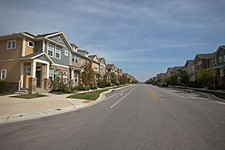Public Notice: The Dog That Didn't Bark
Whatever happened to real property tax reform?
By Nick Barbaro, Fri., June 5, 2015

City Council will take up homestead exemptions on city property taxes at this week's meeting; they're probably already into that sinkhole by the time you read this. And it's not going to go down easily.
Heading into their first budget season, this Council already knows there's not much sentiment for cutting city services – they all came in with agendas of making good things happen, not presiding over an accelerated decay – and so, squirm as they may, they're going to have to admit eventually that, yes, the city in fact needs all the tax revenue it's getting, and although the breakdown of who's paying how much is totally inequitable – nothing City Council can do will fix it.
Let me back up.
The Texas Legislature did pass one meaningful property tax change this session: A $10,000 increase in the homestead exemption on school taxes that, if approved by voters, will save the average homeowner about $120 a year. (Of course, that comes right off the top of your school district's budget, so property tax rates will probably be raised proportionally, so you'll be paying some of that $120 after all, though non-homesteaders – renters, commercial property owners – will be paying part of it for you.) And, significantly, it's a flat dollar amount – meaning it applies equally to everyone, regardless of their home's value. A $100,000 homestead in East Austin gets a 10% cut in their bill, while a $1,000,000 home in Tarrytown gets just 1%.
What City Council is mulling – all that's available to them under state law – is a percentage-based exemption: 20% as campaigned on, or 6% discussed, or perhaps now 5%, with an extra 1% earmarked in some way for rental relief. No matter, the principle's the same at any figure: For every dollar the East Austin homeowner gets, the Tarrytowner gets 10. Bad deal.
Why are we stuck with this bad option? Because in Texas, the only place any of this can get fixed is in the Texas Legislature, and they're just not going to do it. Look through our Lege roundup this week, and you will see no mention of two simple actions that could provide meaningful tax relief across the state:
1) Allow local jurisdictions to enact homestead exemptions in flat dollar amounts, in addition to percentages.
2) Allow appraisal districts access to sales prices of commercial properties, so that they can be appraised more accurately. A recent academic study found that commercial properties in Travis County are likely undervalued by an average of 47%. That means they're paying 47% less in taxes than they should – to all taxing jurisdictions, not just the city's share – and you're making up the difference. And this applies to residents statewide: more so in big cities, but really everywhere. It's crazy, and it has to change. And it will, once enough voters wrap their heads around it.
All of which is why I'm much more excited about Council's likely quixotic appeal of the entire appraisal system than I am about any stop gap homestead exemption.
Flood relief continues: See our Flood of Relief page at www.austinchronicle.com/flood for up-to-date info, but meanwhile, check this out: The Blanco County Flood Relief Benefit Concert on the square in Blanco at the Old 300 BBQ and Back Forty Dance Hall, Sunday, June 7, noon-9pm, with music from Jimmie Vaughan, Guy Forsyth, Alan Haynes, Chris Wall, Stephen Doster, and many others. $10 suggested donation, but c'mon, you can do better than that.
Sustainability can mean a lot of different things. The 19th Annual Cool House Tour, a collaboration of Austin Energy and Texas Solar Energy Society, includes really cool, state-of-the-art homes, but also a Bouldin neighborhood "treehouse" made largely of repurposed and recycled materials, and Foundation Communities' brand-new Capital Studios, providing supportive housing to residents at 30-50% of median family income, in the first affordable housing community to be built Downtown in 40 years. 10am-6pm Sunday, June 7; get info and $21 guidebook tickets at www.coolhousetour.com.
The day before, on Saturday, June 6, from noon-1:30pm, Austin Habitat for Humanity celebrates the completion of a new 31-home community in the Barteny Cove neighborhood, south of Decker Lake – a build that lasted four years, and by involving more than 5,500 volunteers, was able to save more than $2 million in costs associated with the neighborhood build. More info at www.austinhabitat.org.
"Creating Value Through Zero Waste" is a three-day workshop coming to the Downtown Sheraton Hotel June 17-19 – aimed at Austin business managers, entrepreneurs, and engineers who will have to implement new organics diversion (composting) requirements that affect grocery stores and restaurants starting next year. June 10 is the early reg deadline: $35 for Thursday's Zero Waste 101 introductory workshop for businesses looking to start or improve their recycling and compost programs, or Friday's policy-oriented Austin Zero Food Waste Forum, focusing on "higher solutions to food waste." The series is presented by the U.S. Zero Waste Business Council, Austin Resource Recovery, and End Food Waste; register at www.uszwbc.org.
Not all the flood victims were humans. (And for once I'm not even talking about animal shelters.) Even before the Monday flooding, central Austin had suffered massive damage when the first wave of the storm – the one that flooded the Hill Country on Saturday – also knocked down dozens of heritage and other large trees across the city. It's a sad loss – and one that will be with us for a lot longer than any of the commercial damage along Lamar. PARD has completed assessing the damage at Deep Eddy Pool, for one, and found major tree damage, including two large cottonwood trees – which three separate Austin arborists have agreed are a "high risk to public safety," and have to be removed immediately. PARD has applied for removal permits, and notes that "residents visiting Deep Eddy will see a noticeable difference in the landscape," but they're working hard on "recovery landscaping options for this much-loved city asset."
Got something to say on the subject? Send a letter to the editor.












